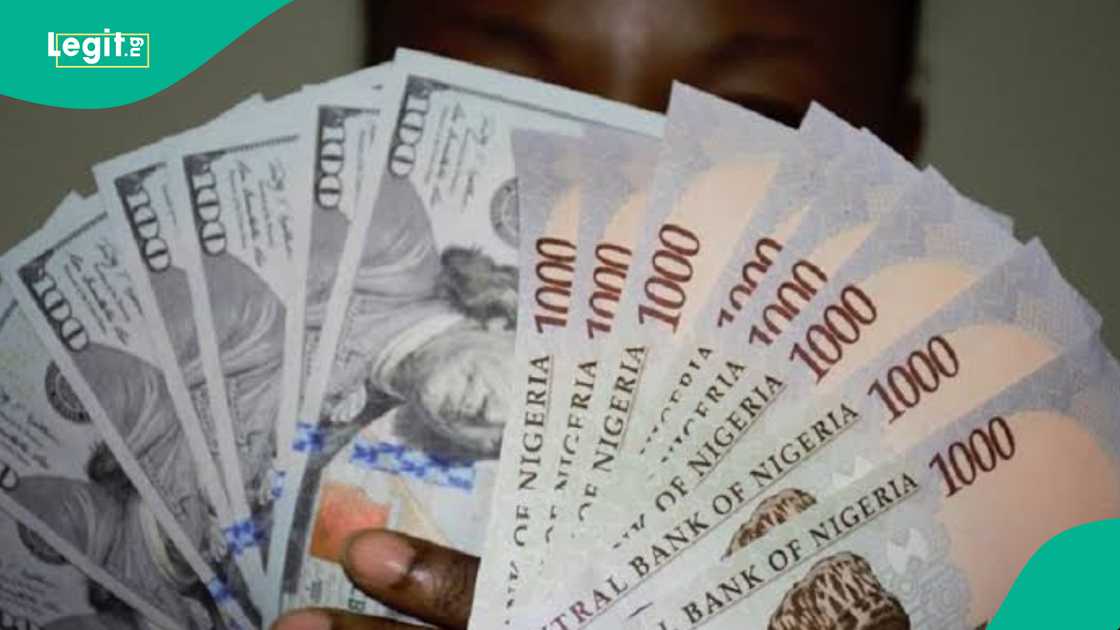Naira Appreciates by N90/Dollar as Foreign Investors Cause Inflow to Rise
- Rising dollar inflows, particularly from international portfolio investors, helped the naira appreciate by 5.7% on the black market and 0.8% on the official market in the first half of 2025.
- Despite increasing foreign exchange inflows, challenges such as growing import bills and debt servicing caused reserves to decrease by 8.5% to $37.3 billion by June 2025.
- Analysts expect the naira to stabilise around N1,595 by the end of 2025, supported by favourable monetary policies and strong autonomous inflows.
Legit.ng journalist Zainab Iwayemi has 5-year-experience covering the Economy, Technology, and Capital Market.
Rising dollar inflows, primarily from international portfolio investors, helped the naira gain N90, or 5.7%, on the black market and 0.8% on the official foreign currency (FX) market in the first half of 2025.

Source: Getty Images
In contrast to the N1,541.36 quoted at the start of June, the naira gained N11.65 on the official market, closing at N1,529.71 on June 30, 2025, the last trading day, according to data from the Central Bank of Nigeria (CBN).
In the parallel market, the value of the naira increased by N90, or 5.7%, from N1,660 to the dollar at the beginning of June to N1,570 at the end of the month. Stronger foreign exchange inflows and heightened market confidence were reflected in the improved exchange rate performance.
“The gradual appreciation of the naira and the shrinking spread between official and parallel rates underscore improved confidence in the FX market. The CBN’s FX policies and its clear policy direction have reduced speculative demand, enhanced FX inflows, and weakened the incentive for rent-seeking and arbitrage,” analysts at FSDH Research said. They noted that the Central Bank has continued implementing reforms to enhance transparency and confidence in the FX market.
“We note that major risks to economic growth and FX stability include possible financial outflows, a lower crude oil price, and output below the federal government’s benchmark. We maintain our earlier forecast that the naira will settle around N1,595 in 2025,” the analysts added.
Nigeria's currency stability and balance of payments depend heavily on capital flows. According to FSDH Research, investor-friendly policies and export diversification helped Nigeria attract $5.03 billion in Foreign Portfolio Investments (FPIs) in the first quarter of 2025.
According to the CBN's most recent Quarterly Statistical Bulletin, overall foreign exchange inflows into the Nigerian economy increased to $27.7 billion in Q4 2024, up 17% from the previous quarter and 78% from the previous year.
Since Q4 2023, FX inflows have been rising, according to analysts at FBNQuest. The increase was mostly driven by a 38% rise in inflows from autonomous sources, which made up 58% of all foreign exchange inflows, totaling $16.1 billion. The net foreign exchange inflow stood at $15.7 billion, the largest since Q3 2021, while total foreign exchange outflows increased by 43% quarter-on-quarter to $12.1 billion.
Autonomous sources more than offset the modest 4% quarter-over-quarter decline in FX inflows through the CBN, which fell to $11.5 billion, with robust portfolio-driven inflows.
However, the CBN's foreign exchange outflows rose by 39% to $10.1 billion, primarily due to payments for other financial commitments and external debt servicing. During this period, the CBN received $1.4 billion in net foreign exchange inflows.
Additionally, FX outflows from independent sources increased from $1.1 billion in Q3 2024 to $1.9 billion. Net foreign exchange flows from autonomous sources grew by 34% on a quarterly basis to $14.3 billion.
While global uncertainties, including changes in U.S. monetary policy, trade policy shifts, and waning external demand, may impact future inflows, FBNQuest expects these autonomous inflows to remain sustained in the near future due to favourable monetary policies.

Source: Getty Images
Key changes at the CBN, such as interest rate hikes, stricter FX policies, and the clearing of FX backlogs, contributed to the growth of external reserves in 2024, according to FSDH. Between April 2024 and January 2025, reserves increased from a low of $32.1 billion to a high of $40.9 billion.
However, due to pressure from growing import bills, service payments, and debt servicing expenses, reserves decreased by 8.5% to $37.3 billion as of June 27 in the first half of 2025.
Naira maintains pressure on dollar amid FX inflows
Legit.ng reported that the Nigerian currency has been on an upward trend for five days in the official foreign exchange market due to a combination of demand and supply favouring the local FX rate.
The Nigerian economy experienced a sharp increase in FX inflow in the second quarter as foreign portfolio investors (FPIs) drove dollar volume in the official market after successive OMO bill sales.
Data from the Central Bank of Nigeria (CBN) disclosed that on Thursday, July 3, 2025, the Nigerian Foreign Exchange Market (NFEM) settled at N1,525.82 per dollar from N1,526.15 the previous day.
Source: Legit.ng





